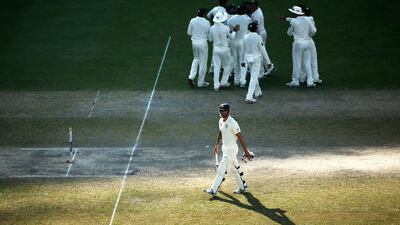So Australia, under the leadership of Darren Lehmann, are mortal after all.
Pakistan have a habit of putting the skids on Test-playing sides with bags full of momentum and, in beating the Australians by 221 runs in Dubai in the first Test yesterday, they have done it again.
Australia have come a long way in the past 16 months under Lehmann but, if they can achieve a drawn series by becoming the first side to win a Test against Pakistan in Abu Dhabi, it will arguably be the finest accomplishment of his reign.
The loss in Dubai is the first major speed bump to hit the side since they lost the Ashes series in England in the summer of 2013.
Following that, they whitewashed England on home soil 5-0 in the northern winter before briefly taking No 1 spot in the world by winning 2-1 in South Africa, a position the Proteas would regain by winning in Sri Lanka.
Now, though, they are on the back foot, although they have not become a bad side overnight by losing in Dubai.
Rather, they are not as good as past results maybe made them look.
As Michael Clarke, the captain, acknowledged, Pakistan did the better job with the bat and ball, and when your opponents outperform you in those two key facets of the game you can have little to grumble about. It was a credit to them they forced Pakistan to spend 68 overs in the field yesterday before they finally yielded, such is the fighting spirit Lehmann has invoked in his charges.
This loss makes it five on subcontinent wickets in a row for Australia, but this loss was as far removed as possible from the 4-0 drubbing in India last year, which ultimately led to the removal of Mickey Arthur as coach.
What Dubai has confirmed is that while Australia are a good side, they are far away yet from being a great side.
There have been cracks in the batting line-up for some time.
The third day’s batting display, where they lost 10 wickets for 186 runs on a pitch with no major demons in it, should not have come as too much of a surprise.
It is astonishing, in hindsight, to think that Australia whitewashed England last winter when you consider their average score at the fall of the fifth wicket in that series was a mere 141.8.
The heroics of wicketkeeper Brad Haddin with the bat, and then Mitchell Johnson with the ball, ensured they got away with those problems, but a misfiring top order will always come back to hurt you.
David Warner continues to impress as opener. His hundred in Dubai was one of the best of his nine to date.
Steve Smith batted maturely yesterday in his failed bid to save the game.
Warner and Chris Rogers also make a good opening pairing.
Clarke is safe at No 4, despite only making it past 30 once in 15 innings (a sensational unbeaten 161 in Cape Town, which proved critical in beating South Africa in March), and Smith is fine at No 5.
Questions continue over the No 3 slot, with Alec Doolan yet to shine in the role.
In his Test debut, Mitchell Marsh was the latest all-rounder to be tried at No 6, though he will likely make way for a fit-again Shane Watson, who also has yet to convince in Test cricket as a batsman, when they take on India in their home series next month.
Since his heroics against England, where he scored 403 runs, Haddin has mustered 38 runs at an average of 7.6, which puts into context that Ashes form.
Bowling wise, Johnson bowled superbly in conditions that were never going to favour his raw pace, and match figures of three for 73 off 43 overs showed that he was at least frugal, if not penetrative, on the Dubai wicket.
Pakistan’s spinners were always going to be expected to have an edge on Australia’s given their experience, but it was still a sorry Test for their No 1 spinner Nathan Lyon, who conceded 220 runs for his two wickets.
He will have to raise his game in Abu Dhabi substantially to give Australia a hope of pegging Pakistan back.
Debutant spinner Steve O’Keefe toiled, too, in taking two wickets in each innings, but went for more than a hundred both times.
If O’Keefe and Lyon cannot find a way to trouble the Pakistan top order more, then the series is effectively lost.
Watching an Australian side, who had whipped through England and South Africa’s batting line-ups on occasions in the past 12 months, take only 11 Pakistani wickets in 223 overs displayed the importance of Ryan Harris has to the team.
Harris, 35, has missed the series as he recovers from knee surgery, but his ingenuity and ability to make the ball move on even the most lifeless wicket would have been invaluable here, if not to at least give Younis Khan and his cohorts something else to think about.
Unfortunately, Lehmann does not have Harris at his disposal, and trying to find quick fixes to his side’s flaws in the batting and bowling departments before Thursday is going to be a tall order.
There is no disgrace in falling short; England in 2012 and South Africa in 2013 both failed to triumph here.
What it demonstrates, though, is how much work Lehmann still has if he wants his side to dominate the sport as so many Australian teams have.
gcaygill@thenational.ae
Follow us on twitter at @SprtNationalUAE

